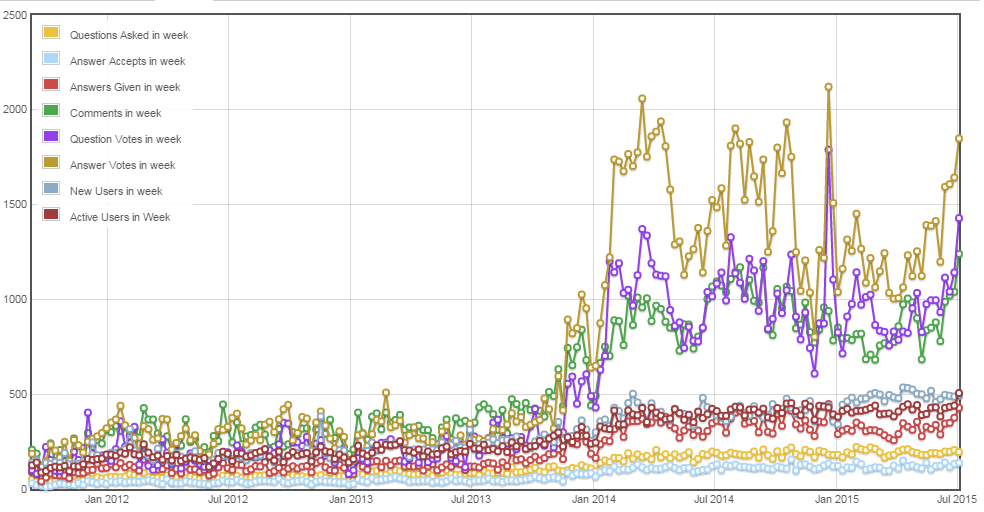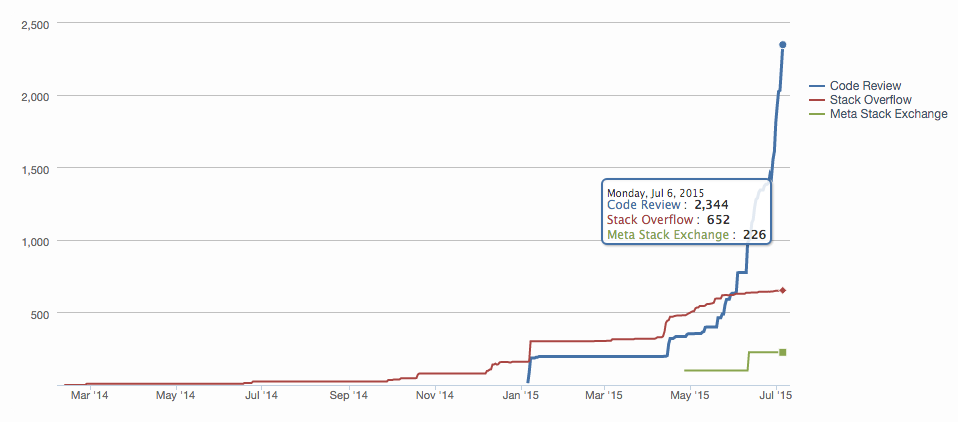Mat's Mug
A question is flagged: Please delete this question - my boss has seen it and says it contains confidential code - he's freaking out and wants me to remove it, but I can't delete it. The question was asked 3 days before, it has 2 answers, one is accepted. How do you respond?
This is a situation that can safely be referred to as, well, a complete mess. If my estimate is correct then a question with 2 answers in 3 days wouldn't have gone hot, and if my calculations are correct it would have generated about 150 rep for 3 users. But that's beside the point (I was just curious about the rep-score impact of such a situation) - regardless of how much rep is involved, a mess is a mess, and messing with users' rep score isn't something to be done lightly.
I think this is a rare and serious enough situation to contact a Community Manager and ask for assistance, but I would also invite the involved users in a chatroom, to make sure everybody is on the same page and let the answerers vent their probable frustrations and voice their concerns. At the end of the day, it's just one answer gone - it's easily caught up with another answer on another question.
What do you think about the new possibilities of migration coming with graduation? Graduation means we will get the ability to migrate questions away by community vote. It also means we may end up on the migration path of other sites. These user-migrations can be notoriously bad (see the old programmer's dilemma). I personally fear they will be. This means an additional moderation duty and quite possibly drama with other sites on the network... How would you address problems coming up with large-scale low-quality user migrations?
I can't help but mention @Duga here. She's (yes, it's a she) being a tremendously useful tool to prevent low-quality migrations and cross-posts already, and even if a direct migration path from Stack Overflow to Code Review is implemented, I'm pretty sure there will still be comments on these posts, that @Duga will pick up.
I truly believe accepting or rejecting migrations is mostly a community thing, that any user with close/reopen privileges can contribute to, and that shouldn't require much moderator intervention in itself, except if/when things heat up.
If the quality of migrated questions turns out being consistently sub-par, I'll be happy to post on Meta.SO about it, to remind everyone the #1 golden rule for migrating posts: don't. migrate. crap.
As a moderator on Code Review you will also become a moderator on all of chat.stackexchange.com - which has rooms for most sites (all except Stack Overflow and Meta.StackExchange). A heated discussion is flagged in "The Suspension" chat room which is associated with BridgeBuilding.stackexchange.com - there is swearing and name calling. What do you do?
I'd enter the foreign chat room and lurk a little, get a feel of the general mood and, if the discussion is really heated and I'm the only moderator in there and there's no room owner present, I'd ping the offender with a friendly reminder to keep things civilized. If things degenerate further I'd kick-mute as a warning.
The idea is that I'd go with an incremental approach - being trigger-happy with banning users I don't know in a chat room I don't frequent doesn't seem like a very good idea to me.
A user has an issue with an action you, as moderator, took; calling you out on meta, a chat room, comments, or otherwise. How do you handle this?
If a user has an issue with an action I took, then it's likely that I have already interacted with that user to justify that action: there's no point trying to justify it further, unless I had been unclear.
Especially if I'm offended by the way that user is calling me out on meta, a chat room, comments, or otherwise, I'd step out and head into the moderators' chat room, where I'd seek support and/or assistance.
Throwing oil onto the fire is never a good idea; I'd rather see someone that's not directly involved put it out instead.
How would you deal with a user who produced a steady stream of valuable answers, but tends to generate a large number of arguments/flags from comments?
A first intervention would be to leave a comment on a recently flagged comment thread - if the comments happen to be under one of their answers, I'd write an impersonal comment to remind everyone that comments should be constructive and used for clarifying a question or answer; the author of the post would get pinged with my comment. If the comments are under another user's post, I'd make a more personal @ comment to ensure the user gets the ping.
A second intervention would be less subtle, and would kindly @ask the user to have these discussions in chat, since we're not a discussion forum.
A third intervention would simply wipe out the comment thread, with a note saying comments were removed, please use chat for discussions.
Idea being, as I said earlier, to be incremental in interventions.
How would you handle a situation where another mod closed/deleted/etc a question that you feel shouldn't have been?
I would ping them in the moderator chat room and ask why they closed/deleted/etc a question, and explain why I feel it shouldn't have been.
Then we'd either agree (either way) or MORTAAAAL KOMBAAAAT!! take it to meta for the community to decide.
"Moderators don't vote. They decide." Making binding decisions instead of voting will be a paradigm shift for nearly all of the nominees. How do you plan on making this adjustment?
I see this mostly as being the 5th user to cast a close vote, or only casting a binding vote when site activity is low and a question is blatantly off-topic.
As one of the Revivalists, I have seen some users come through chat that are active and excited about Code Review, and they do well for months at a time, but then they drop off the face of the planet Code Review, sometimes they come back and some haven't come back yet. Are you in it for the long haul? Are you going to stick with us for the long haul? Are you ready to spend hours on Code Review, just for the love of the site? Are you Addicted to Code Review? How can you show us that you are serious about Code Review?
visited 713 days, 191 consecutive - and that hiccup was an accident. From my very first meta-answer on this site:
From this day on I will make sure I visit as often as possible, read as many posts as I can and vote as often as possible. If we all do that the site will eventually come out of beta.
That was 2013-09-04. Yes, I'll be sticking around.
Code Review has approximately at 15-to-1 upvote-to-downvote ratio, nearly double Stack Overflow's approximate 8-to-1 ratio. As a moderator, you'll be regularly viewing the worst of the worst posts made to Code Review. Do you consider up and down voting of a moderation tool at all? Do you think you downvote enough questions? Do you think you upvote enough questions?
That's a rather interesting question. To some degree, yes, downvoting can be considered a moderation tool. For the longest time, I've considered upvoting as a user retention tool, a way to reward contributors that bring value to the site.
If CR's up:down ratio is 15:1, mine is currently something like 40:1, which I've heard could be considered "outright alarming". I have over 12K votes under my belt, and I'm proud to be responsible for over 11K upvotes on this site - I've probably generated well over 100K rep with these votes. Of course, we're not in 2013 anymore, things have changed.
But let me take you back there. This is the first answer I received on my first meta question:
There's a reason why this site is still in beta:
NOBODY VOTES
Simple. Sorry for caps but it's true.
https://codereview.meta.stackexchange.com/a/851/23788
That was September 13, 2013. Then this happened:

And it happened for a reason: the voting culture on this site has dramatically changed from what it was, TONS of rep was generated, user base pretty much tripled, and daily visits went from ~8K to ~40K during that time frame.
And we did this as a community - my votes alone couldn't have done that, I only get 40 a day anyway. But I reckon inciting people to upvote, and upvote a lot. This was in response to our CM review, where voting and reputation was specifically identified as being a serious problem:
Voting is an odd beast here. When we reviewed the site, the front page had a dearth of voting. Even looking now, in the last 100 questions asked and the last 100 answers posted, less than 10 of each have scores past 3 with several negatively rated. Now, there are users who vote - vote a lot in fact, as most of the top users have hundreds of votes under their belts (with decent downvote rates as well). But in spite of this, there’s still a humongous bed of users sitting in the ~100-200 reputation range and not actually in the major privilege levels. So for where-ever all the votes are going, it ain’t accumulating.
I like to think my votes have contributed to revert that.
With that said, these issues are a thing of the past now, and I tend to downvote more and more, although I still prefer not voting on a question I'm closing anyway, and keep that vote to reward a deserving question/answer instead. But if a bad post hasn't hit -2, I'll downvote it, yes.
I don't see much use in casting the 6th or 7th downvote on a question; it seems to me that -3 is enough to get the message across.
In what way do you feel that being a moderator will make you more effective as opposed to simply reaching 10k or 20k rep?
These thresholds are for graduated sites. We're talking 2K rep for 10K moderator tools, and 4K rep for 20K trusted user. I've had these privileges for quite a while now, and I don't really know what other tools moderators have at their disposal (I only have a bit of a slight idea) - but this is Stack Exchange, and a diamond next to my name would mean this community has given me the responsibility to use whatever powers are given to me, ...with moderation.
One thing I think being a moderator will make me more effective with, is my meta participation. Other than that, it will definitely make me more effective with handling flags, and I hope to learn new tricks to discover suspicious voting patterns (/sock-puppets /vote-fraud), by being less focused on ranking ahead of @SimonAndréForsberg my own account and more on the site itself, its content and, more importantly, its users.


